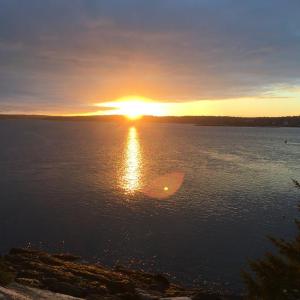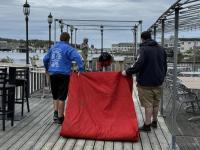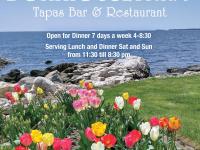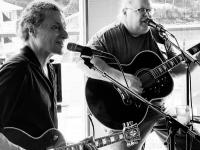Leading them to water in Boothbay Harbor
Like the rest of the nation, Boothbay Harbor is struggling with drug addiction and its costs. Here, police say the drug problem, particularly heroin addiction, is widespread. Hidden in plain sight. Sometimes making headlines, but more often simply evidenced in an obituary of someone suddenly, inexplicably gone.
Perhaps because the community is so small and so tightly knit, the Boothbay Harbor Police Department has taken a small town approach to the problem. The department has not abandoned traditional investigation and arrest, but focuses as much on reaching out to drug addicts to get them help instead of jail time.
Here the line between professional and personal sometimes gets blurred. Boothbay Harbor Police Chief Bob Hasch was raised on the peninsula and raised his family here. Many of those now addicted to hard drugs are kids he coached in football or watched play basketball in the high school gym. He knows them; he knows their families.
“It’s heartbreaking to listen to these kids. They’re going through hell,” Hasch said.
Hasch and his fellow officers routinely seek out drug users and provide them with the tools and resources they need to get off and stay off drugs. They knock on doors; they find people around town.
A good example is Gabriel (not his real name), who has been struggling with alcohol and drugs for more than half of his young life and is now in recovery. Born into a “normal, good family” in New York, he enjoyed all the opportunities of middle class America, including vacations on Ocean Point. Despite his advantages, he was drawn into a culture and lifestyle that upended his life.
Gabriel said his trouble with substances began in the eighth grade at a family party, where the kids snuck liquor into the basement and he got drunk for the first time. In high school, his drinking expanded into other drugs, including cocaine. And he admits to an inherent attraction to the lifestyle.
“Growing up in New York, you see the people and the dealers and it appealed to me. I liked the gangster image. I liked the entrepreneurial aspects of it,” he said.
For some time, his parents “knew something was up but they didn’t know how bad it was.” As more things and money disappeared from the household, “they got it” and Gabriel was sent to rehab for the first time. He went unwillingly and throughout his six months there, he planned how to get out and back to his life.
After rehab, he lived an outwardly normal life. “I had a car, had a series of jobs, I would try to be normal,” he said. But at the same time, he was living a secret life. Using cocaine regularly and then using other drugs and alcohol to counter its innervating effects. He spiraled further down into the addict’s life and the crimes and betrayals necessary to sustain the habit became a mainstay.
“I knew something had to change but I wasn’t ready to give it all up. I tried to go to Florida to rehab and I just became a better addict and a better criminal,” Gabriel said. Florida was also where he started using heroin.
Gabriel finally got clean the hard way, “kicking concrete” — withdrawing alone, without medication in a jail cell, where he spent six months for two charges of driving while intoxicated. He not only got sober in jail, he found the motivation that he previously lacked.
“Jail was a turning point. It showed me I had the strength to survive without drugs and alcohol. I also realized that if I kept going the way I was it was where I would end up.”
He decided on a fresh start in Boothbay Harbor. With a steady job and family support, Gabriel stuck to the straight and narrow for months, but eventually found himself on the same road. Again, it started with drinking.
“It happened over two weeks, but eventually I went from alcohol back to heroin.” Soon he was back to his “old ways, scamming, stealing, asking my parents for money.”
He started dabbling in heroin in November. By March, his life was out of control again — jobless, homeless and hurting those he loved most.
Gabriel said Hasch reached out to him in November but he wasn’t interested. “He wanted to nip it in the bud. He planted the seed that he was there and that never left me.”
In March, finally ready for help. Gabriel went back to Hasch. “ When I went in he greeted me with open arms.” Hasch gave him a packet of information so he could get help with his addiction and also, healthcare, food and housing. Gabriel said Community Navigator Amy Winston helped him immediately with food and shelter.
A few days later Gabriel was back at the Howard Street police office, now truly desperate for help. Administrative Assistant Mo Smith said Hasch was in a meeting and Gabriel kept coming back, obviously agitated. On his fourth visit, Smith interrupted Hasch. Gabriel told Hasch he knew he would not make it through the day without getting high.
“He dropped everything and took me to the ER (actually Hasch said it took two visits to find a willing doctor) where I was medicated. He stayed with me until my dad got here,” Gabriel said. Hasch also connected Gabriel with Dr. Alamo and Lisa Carbone at the Family Care Center and Gabriel began counseling and suboxone treatment. Gabriel, sober now for a few fragile months, goes to AA meetings every day, a support system he credits with his success.
“I think in Boothbay Harbor you have a real chance that you wouldn’t have in a lot of towns and cities. Here the police and the community genuinely want to help. I’ve never experienced that before.”
Gabriel is just one of several addicts who have Hasch’s cell phone number. He answers their calls day or night and the personal toll it takes on him and his fellow officers is sometimes apparent.
Last week, when another local man died of a drug overdose, Hasch was despondent. “It’s terrible, it’s just terrible,” he said over and over again the day after the death. He hadn’t slept the night before and he kept questioning what more he could have done.
Gabriel, stoic in the face of another avoidable death, this time offered support to Hasch, “You can lead them to water but that’s all you can do.”
Although he readily acknowledges that Boothbay Harbor has not found the solution to the drug problem, Hasch said he has faith in the support network this community offers.
“A lot of programs will tell a drug addict you have to leave the area to get well. Here I think it’s just the opposite. I tell them to stay here.”
Event Date
Address
United States

























